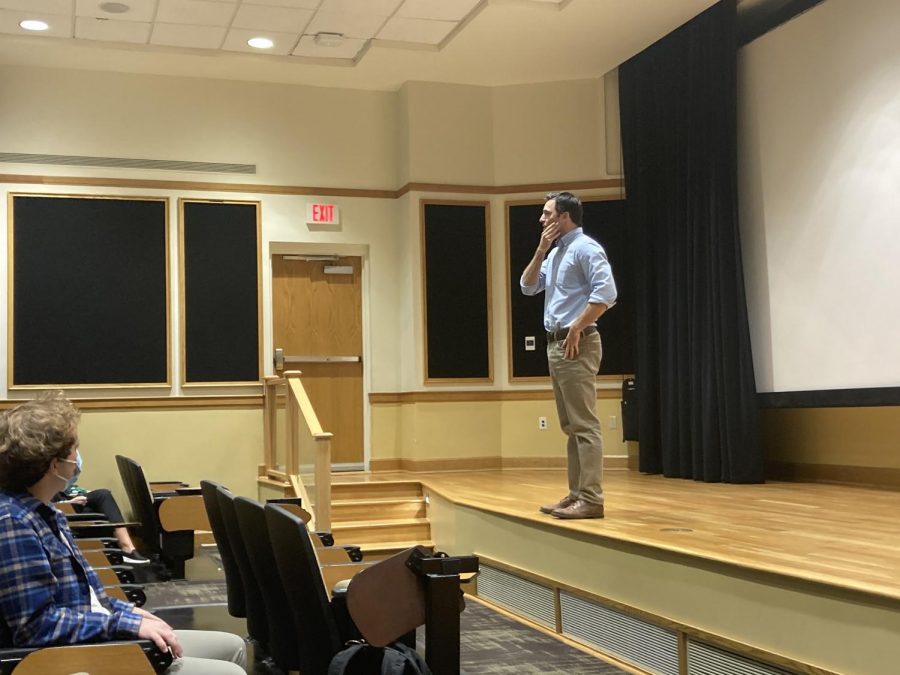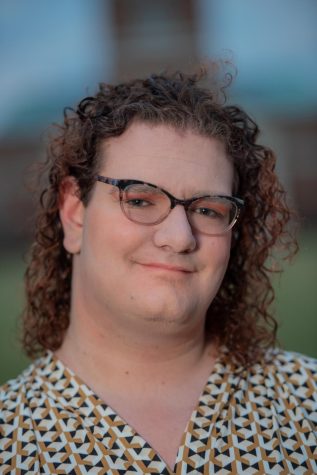Jeff Jackson holds town hall
The state senator and U.S. Senate candidate came to Wake Forest’s campus on Monday afternoon
State Senator and U.S. Senate candidate Jeff Jackson takes questions from students, faculty, staff and alumni at a town hall event in Pugh Auditorium Monday afternoon.
November 4, 2021
With control of Washington on the line, pundits and anxious observers alike have turned their attention to North Carolina’s Senate race.
On Monday afternoon, State Senator Jeff Jackson, one of three high-profile candidates vying to be the Democratic nominee in that race, spoke to students, staff, alumni and community members in Pugh Auditorium.
At the event, Jackson explained his plan to flip retiring Senator and Wake Forest alumnus Richard Burr’s seat.
“We’re gonna kill it in the urban centers,” Jackson told the crowd. “Charlotte, I’ve represented them for seven years, and they like me there. We’re gonna run the score. But, we’ve got 80 rural counties in North Carolina. North Carolina has the second-largest rural population of any state in the country. If we lose them 80-20, we’re not viable as a party. If we lose them 70-30, we win the race.”
Jackson also touted his 100-county campaign strategy, which he says will help fight against the misinformation that may be contained in attack ads later in the campaign.
“To familiarize yourself with voters to that extent, to give you some amount of inoculation against disinformation, that takes 100% of your effort,” Jackson said. “It takes 100% of our [efforts] even make a dent in that bubble. But if you don’t go out to these places multiple times, it’s hopeless.”
Participants asked questions on topics ranging from the Supreme Court to immigration to hog farming practices.
“It’s just been a wonderful education for me,” Jackson said of the issues raised by the town hall participants. “I get as much out of this as all of you.”
On the all-important topic of healthcare, Jackson said that he supports a plan that would put medicare on the public exchange by 2024. He also stressed that there simply are not enough votes to create single-payer healthcare.
During the event, Jackson was asked what his “niche issue” is. The state senator said that he is a passionate advocate for early childhood education.
“We were the first state to have universal, full-day kindergarten. There was a lieutenant governor in the 1970s named Jim Hunt who got that done. Then he came back with SmartStart, and then we did pre-K, and we just haven’t done much in the space since then.”
Jackson continued: “If they keep the provision with preschool for three-or-four-year olds [in the reconciliation bill], that is huge … I kind of look at early childhood like I look at a stock portfolio. If you just get one or two in there that really go the distance, it makes up for a lot of other bad ones. As far as the government making investments, if we could just do a platinum edition for early childhood, that, frankly, makes up for some other dumb stuff.”
Some who had not heard of Jackson or were leaning toward one of his primary opponents, such as former North Carolina Supreme Court Justice Cheri Beasley, found themselves impressed.
“You could tell Jackson really has a good understanding of many of the issues,” freshman Tarak Duggal said. “I’m excited to see where this race goes, and I want to keep up with Jackson now, just because I hadn’t thought much about him prior to this event.”
Alumnus Mitchell Tague, who said before the start of the town hall that he was seriously considering voting for Beasley, was also impressed.
“Throughout the entire town hall, his focus on practicality and advocating for that not as a way to shoot down ambition, but as a way to find the ambitious projects we can complete, really shone out well to me,” Tague said.
Many students attended the event because they wanted to be informed about one of the most important elections of the 2022 midterm cycle. For most students, these will be the first midterms in which they can vote, and the desire to be prepared is widespread.
“Now that I can finally vote, I’m looking forward to making a decision based on what I actually feel, rather than just following random noise I hear on Twitter or on the news,” junior Brendan Mirra said. “So, I [was] excited to see what he has to say.”
Deb Marke, co-director of Deacs Decide, a nonpartisan group dedicated to increasing voter participation on campus, was thrilled that students had the opportunity to get answers on issues that mattered to them.
“I think it’s always a really great practice to talk to your politicians,” Marke said. “We elect them, and they’re supposed to work for us. So, giving space to ask questions, to hear more and to also learn about at least one candidate’s platform could be a really great way to start thinking about who is the person that speaks to the issues that you’re concerned about.”























